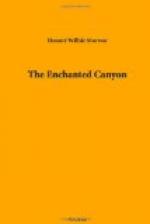“There’s a woman out here from the Sunday Times, Mr. Secretary. She wants to interview you on your ideas on marriage. She has a letter from Senator Brownlee or I wouldn’t have disturbed you. She looks as if she could make trouble, if she wanted to.”
“Tell her I’m sorry, but that I have no ideas about marriage and that Jonas is as near a wife as I care to get. He henpecks me enough, don’t you, Jonas, old man! Abbott, just remember, once for all, I won’t see the women.”
“Very well,” replied Abbott. “Will you dictate a few moments on your report to the President on the Pension controversy?”
“Yes!” Enoch pulled a handful of notes out of his pocket and began to dictate clearly and rapidly. For ten minutes his voice rose steadily above the raucous uproar that floated in at the window. Then the telephone rang. Abbott answered it.
“The White House, Mr. Secretary,” he said. Enoch picked up the receiver. After a few moments’ conversation he rose, his face eager.
“Abbott, the Mexican trouble appears to be coming to a crisis and the President has called a cabinet meeting. I doubt if I can get back here until after five. Will you express my regrets to the Argentine delegation and make a new appointment? Is there any one in the waiting-room?”
“Six people. I can get rid of them all except Alton of the Bureau of Mines. I think you must see him.”
“Send him in,” said Enoch. “I’ll ask him to ride as far as the White House with me. And I’ll be back to finish the letters, Abbott. I dare not let them accumulate a single day.”
Abbott nodded and hurried out. A tall, bronzed man, wiping the sweat from his bald head, came in just as Jonas announced, “The carriage, Mr. Secretary.”
“Come along, Alton,” said Enoch. “We’ll talk your model coal mine as we go.”
It was six o’clock when Enoch appeared again in his office. His linen suit was wrinkled and sweat stained between the shoulders. He tossed his hat on a chair.
“Abbott, will you telephone Senor Juan Cadiz and ask him to meet me at my house at ten thirty to-night? He is at the Willard. Tell Jonas to interrupt us promptly at seven, I mustn’t be late to dinner. Now, for this mess.”
Once more he began the attack on the day’s mail, which Abbott had already reduced to its lowest dimensions. Enoch worked with a power of concentration and a quick decisiveness that were ably seconded by Charley Abbott. It was a quarter before seven when Enoch picked up the last letter. He read it through rapidly, then laid it down slowly, and stared out of the window for a long moment. Abbott gave his chief’s face a quick glance, then softly shoved under his hand the pile of letters that were waiting signature. The letter that Enoch had just read was dated at the Grand Canyon.




